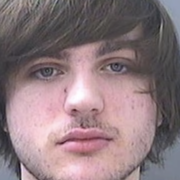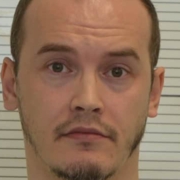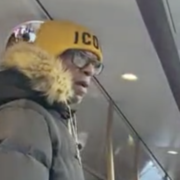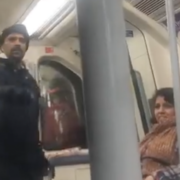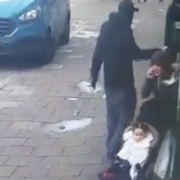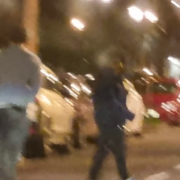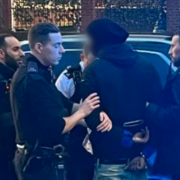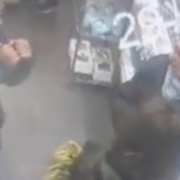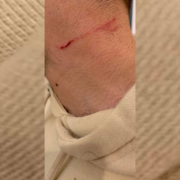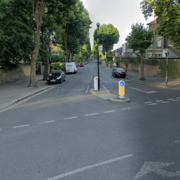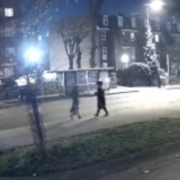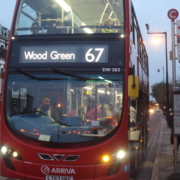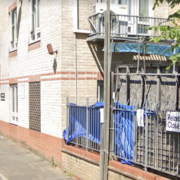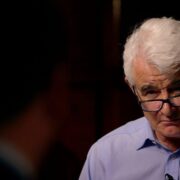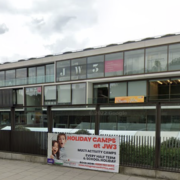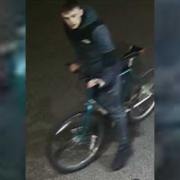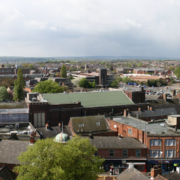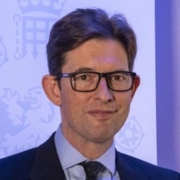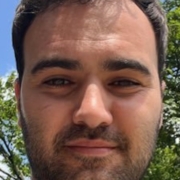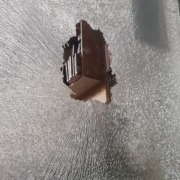Ruth Posner BEM, a Polish-born British Holocaust survivor who escaped the Warsaw Ghetto as a child, appeared on the most recent episode of Podcast Against Antisemitism where she recounted her harrowing ordeal during the Shoah, and shared her thoughts and feelings on modern antisemitism and Holocaust denial.
Ms Posner described how she grew up proud of her Polish identity, with many Catholic friends, and whose non-religious Jewish father viewed himself as a “humanist”. These factors, she explained, contributed to the shock that she felt when she was forced into the Ghetto alongside religiously observant Jews, with whom she felt that she had little in common.
However, Ms Posner noted that many of her Catholic friends spread the antisemitic myth of deicide and that she began to feel a change when one day at school, a girl hit her and said: “You killed our Lord, and you should be punished for it.”
Shortly after that incident, she noted, war broke out. Nazis would knock at the door of Ms Posner’s family, telling them that they had fifteen minutes to gather their belongings and leave.
“I couldn’t understand what was happening,” she said. “And my mother said to one of the guys, ‘You’re wearing a black uniform, but your heart can’t be black?’ And she was hit. He just smacked her…it was the first sign of violence that I had ever witnessed.”
She revealed how her family was then forced into the Ghetto. “We were marched with other people, I can’t remember how many, to a house where I met people I didn’t normally associate with, not because I didn’t want to but just because my life was different. [I was] with very religious Jews with peyot (sidelocks) who spoke Yiddish, and I felt estranged from them, strangely enough.”
Ms Posner recalled the “filthy old house packed with people” where her and her family were given one room in the basement to live in alongside others, noting that her father slept on the floor.
“We heard trucks, now and then, and people shouting ‘heraus, heraus’ (‘out, out’), and the trucks were being loaded with people living in that house,” she said, unaware that what she was hearing were the first instances of deportations to concentration and extermination camps.
“People were taken out, we didn’t know what the hell was happening.”
Ms Posner revealed that her father created a plan for her to escape the Ghetto, which began with creating a fake passport and acquiring her work as a slave labourer in a nearby leather goods factory. She recalled being physically assaulted in the factory.
One day, Ms Posner’s aunt decided that they would both escape the Ghetto during their journey to the factory, by walking across the road to the “Christian” side.
“She explained to me, ‘Today, we are going to do this. Now, it is dangerous, but don’t be afraid because there is a possibility we will survive…I will watch, and tell you when the time comes to cross the road’. She was watching the two Nazi soldiers and they were obviously very, very careful in watching what was happening.
“They stopped for a cigarette, and so they were talking to one another with their backs turned to the road. When I say this, I still can’t believe that this is not a story, but it actually happened, and she said to me ‘Now, now, just walk down, cross the road. Don’t run, just go and walk. When you feel the time has come, take your band off.”
The band was, in fact, the yellow Star of David armband that Jews were forced to wear during the Holocaust.
“All these years ago, I still can’t believe how lucky we were. We managed to get across to the other side.”
While Ruth and her aunt managed to escape the Ghetto, she later discovered that her remaining family were murdered in the Treblinka extermination camp.
Ms Posner and her aunt then lived in hiding using fake names and backstories and posing as Catholics for years, until they participated in an abortive but bloody Polish uprising against the Germans, whereupon they were captured and taken to Germany as Polish prisoners of war, their Jewish identity still a secret.
The Germans, after keeping Ms Posner and her aunt as prisoners for some time, forced them both onto a train. “All of a sudden, we hear strange noises, and they’re airplanes dropping bombs.”
Ms Posner stated that “the Germans were just as frightened as we were, because those were American bombers.”
Amidst the chaos and violence around her, Ms Posner and her aunt made an escape, and they once again found themselves fleeing. They would live with, and work for, German farmers, until the end of the war and the arrival of British and American soldiers. In a remarkable scenario during this period, Ms Posner recounted, she and her aunt found themselves hiding Germans from Allied soldiers.
Speaking on her thoughts and feelings on modern antisemitism, Ms Posner said: “For many years, I didn’t particularly want to talk about my past, and my story. But, this kind of thing, Holocaust denial, I don’t want to talk about it, I want to scream about it.
“When I hear Holocaust denial…it makes me sick. That’s all I can say. There are no words that are going to express the feeling, because words come from thought, and this comes from my innards. I could scream. I wish I could speak to the person who said it. I wish I could actually exchange ideas.”
Ms Posner is also a model in Campaign Against Antisemitism’s current national billboard campaign to raise awareness of antisemitism, a first-of-its-kind for Britain.
The podcast can be listened to here, or watched here.
Podcast Against Antisemitism, produced by Campaign Against Antisemitism, talks to a different guest about antisemitism each week. It streams every Thursday and is available through all major podcast apps and YouTube. You can also subscribe to have new episodes sent straight to your inbox.
Previous guests have included comedian David Baddiel, television personality Robert Rinder, writer Eve Barlow, Grammy-Award-winning singer-songwriter Autumn Rowe, and actor Eddie Marsan.


